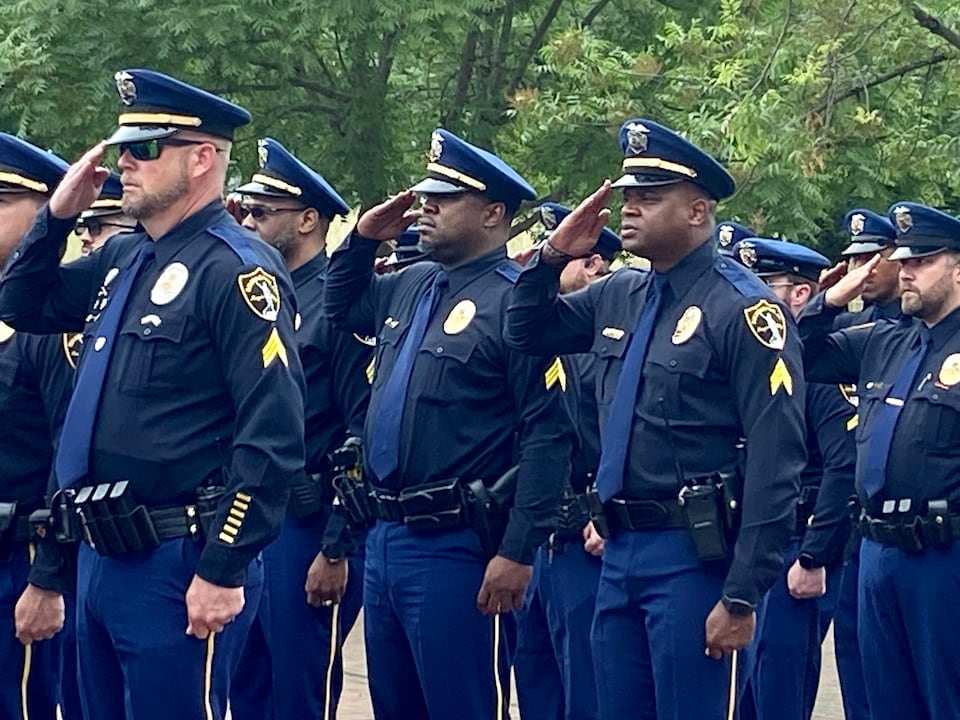Ashlee Cote had to readjust her own life on a tragic day in 2009, when her then 20-year-old husband died in a helicopter crash in Iraq.
“The tragedy showed me that I needed to take care of myself … so I could take care of my family,” said Cote, who met her husband – Army Spc. Michael Cote Jr. — while the two were in basic training. They married and had a daughter, Brooke, who was six months old at the time of her father’s death.

Fifteen years later, Ashlee Cote has turned those experiences into a career as a social worker and counselor who is now heading up one of Alabama’s more unique wellness programs for police officers. She will begin her work next month after the Spanish Fort City Council, on Monday, unanimously approved a recommendation for a police policy change that requires officers to participate in an annual mental health wellness visit with a trained professional.
“It’s the 1,000th percent reason I wanted to get into therapy with veterans and first responders,” said Cote, 36, who operates her practice in Mobile, referring to how she sought counseling herself after her personal tragedy. “I am honored to be a part of this first group. This is my passion. These men and women deserve to have support.”
Overdue
The Spanish Fort program is believed to be only the second in Alabama requiring police mental health visits for all its police officers. Alexander City, northeast of Montgomery, is the first. That program has been around for about eight years.
The mandatory visits come at a time when the stress of police work is getting more attention nationally, as mental health is increasingly becoming an acceptable addition to wellness programs for first responders.

Police work, by its very nature, is considered a high stress occupation and law enforcement personnel are at an elevated risk for mental health concerns. Statistics show that more law enforcement officers, firefighters, and corrections officers are lost to suicide each year than to line-of-duty assaults and car crashes.
“I don’t believe there is much attention given to the fact that we are people, too, and the job is stressful and has been in the past decade,” said Spanish Fort Police Chief John Barber, who advocated for the policy change that is allowing for the program to happen. “So many people have left the job due to pressure from themselves or their families about the stressors involved and they see it as not being worth it over what it’s doing to me (mentally and physically).”
He added “This is overdue for law enforcement. It’s ridiculous we haven’t done anything yet.”
Natural hesitancy
But counseling sessions are something that law enforcement has, historically, avoided. Stigma and fear of job-related consequences often prohibit law enforcement officers from seeking mental health services.
“Naturally, there is going to be hesitancy,” Cote said. “Mental health is not something that is talked about a lot. We want to change that narrative.”
Barber said he has discussed these concerns already with the city’s 29 sworn police officers and four dispatchers who will be participating in the first year of the mandatory wellness sessions.
“I’m not looking to make sure that ‘hey, are my officers, OK?’” Barber said about the outcomes from the initial mandatory sessions. “If they meet with the therapist and are found to be suicidal or homicidal, I’ll be notified. But if they hit a rough patch, that is fine, and I don’t need to be notified about that. It’s only in the most extreme situations where they are a liability to themselves.”
Officers are not required to attend any session beyond their initial meeting with Cote. They are also not required to talk about anything if they do not deem it necessary.
“I told them, ‘If you don’t need it, that’s good, just go in and talk about football,’” Barber said. “But someone in this department might need it.”
The program doesn’t cost anything to the officers, nor does it cost the taxpayer. The Spanish Fort Law Enforcement Foundation, a non-profit formed about three years ago, is contributing the $20 co-pays for each of the officers to participate in the mandatory initial session. Subsequent meetings with Cote or anyone else will require the officers to pay their own co-pay.
“It’s another step forward in police work,” Spanish Fort Mayor Mike McMillan said. “It’s no cost to the city. You’re just asking someone to talk to a trained professional and they may not want to speak. But it will require an officer to go down and at least talk to the counselor.”
Alabama efforts
Donny Shaw, chairman of the Alabama State Office Well Committee through the Fraternal Order of Police, said Barber’s approach might be a first in which an Alabama police agency changed its own policies and procedures to mandate the wellness sessions.
He said that wellness remains a priority during training sessions in Alabama. A forthcoming July 27 FOP training will include Peer Support, Crisis Intervention Team (CIT) training, and Officer Wellness programs for individuals and at small agencies.
A host of agencies do have internal Peer Support training, including Birmingham and Huntsville. Those programs typically connect officers with someone who has lived through mental health issues or other concerns within a non-clinical setting.
In Birmingham, where police have been inundated with a wave of gun violence this year, the city offers mental health counseling to all employees and has a Peer Support team. The programs are not mandatory for police officers to participate unless they are involved in a critical incident, according to Officer Truman Fitzgerald, a spokesperson with the Birmingham Police Department.
City spokesman Rick Journey said that all City of Birmingham employees are eligible for the mental health services through Behavioral Health Systems. He said the city does not have a percentage break down of those within the department who utilize the services.
Mobile also does not require mandatory wellness sessions. The city does, however, have eight free visits per year where police officers can go to counseling, said Mobile Police Department spokesperson Blake Brown. The city also has an internal Wellness Committee that is developing a Peer Support system, though it’s not in place yet.
Barber said that Spanish Fort also has Peer Support and CIT and called them “great programs that are helpful for officers dealing with people on the streets.” He said the mandatory wellness sessions with Cote differentiates from those other programs in that it “focuses on our officers to see if they are A-OK as they are doing their jobs every day.”
The right connection
Dr. Lewis Schlosser, managing partner with The Institute for Forensic Psychology in Oakland, N.J., said the approach in Spanish Fort is similar to what police agencies across the country are considering as an additional wellness tool to improve officer lives, which in turn should lead to better functioning officers at work.
He said how these programs are communicated to the officers is critical to their success. Specifically, calling the session a “wellness visit” as opposed to a “wellness check” is a key distinction, he said.
“We’re very specific that nothing in the visit should be construed as evaluative,” Schlosser said. “Even calling it a ‘check’ is a problem. The spirit and intent of this kind of wellness program is to reduce stigma among police officers with regard to mental health treatment and to normalize an interaction between the police officers and mental health professionals. It’s about officers maintaining their wellness, reducing officer suicides, and helping them retire healthy.”
Schlosser pointed out that some states have mandated these visits, but this can lead to potential problems depending upon how the law is written. In Connecticut, for example, the law regarding wellness visits states that police officers, as a condition of continued employment, must submit to a periodic behavioral health assessment. Instead of creating a wellness visit, he said, the state of Connecticut is mandating a de facto fitness for duty evaluations – which Schlosser believes is not going to achieve the goals related to improving officer wellness.
Schlosser said a key to a program’s success is to include a mental health professional who is culturally competent with police and public safety personnel.
Margaret Taylor, a licensed professional counselor in Alexander City, believes Spanish Fort has the right person for the job.
Taylor, who provides mental health wellness services in Alexander City after Police Chief Jay Turner started the program, discovered Cote and connected her with Barber.
“The issue was ‘how do I find a counselor I know who will serve law enforcement?’” Taylor said. “It’s specialized and a culture of its own. I didn’t know anyone in the Mobile area so I was starting from scratch and researching therapists in the area. I researcher Ashlee, read her profile and her background and experience seemed like someone who could work with that culture.”
Said Cote, “They felt I would be a good fit with the background I have with the military and first responders and veterans, which is my niche.”
Cote has since met with a handful of police officers and participated in ride-alongs with police officers. The meetings allow the officers to get to know more about Cote’s personality, while she learns more about their daily jobs before the first sessions start.
“For the program to be successful, they need to know the person,” Barber said. “Cops are hesitant about mental health. Going in there with an unknown person is also a difficulty. Making her known is extremely important. She’s doing that the next couple of weeks.”
Extra resource
Barber said the mandatory wellness sessions, now part of the city’s policy, will be required once every year. After the initial sessions in August and September, they will not be required again until sometime in 2025.
Barber said he volunteered to be the first person to meet with Cote at her Mobile office on Aug. 19.
Cote said for the police officers she sees this fall, “everything is in their hands.” She wants the officers and – if they choose – their families, to feel comfortable with her and be interested in returning for future sessions.
“These officers know or have been told regularly that I cannot take their badge away from them,” she said. “I can’t take away their job. I am a non-biased person they can talk too. I’m not trying to pin a label on anyone or hurt anyone’s career. I want to be that extra resource for these men and women who do everything for us.”
In Alexander City, Taylor said there was a 40% return rate among first responders who participated in the initial wellness sessions.
“That was a pleasant surprise,” she said. “Anytime you make someone do something, it’s not a great reaction and in the beginning, there was not many who were excited about it. But Chief Turner was amazing in getting their buy-in. He’s their leader, and said it was OK for them to (participate). He played a huge role.”
Taylor said she hopes the approaches in Alexander City and Spanish Fort will be considered at other policing agencies in Alabama.
“It’s the hope this will become more of the norm, and this will become part of their wellness, and this becomes more of what is expected and that there isn’t shame associated with it,” Taylor said.
___
© 2024 Advance Local Media LLC
Distributed by Tribune Content Agency, LLC.



